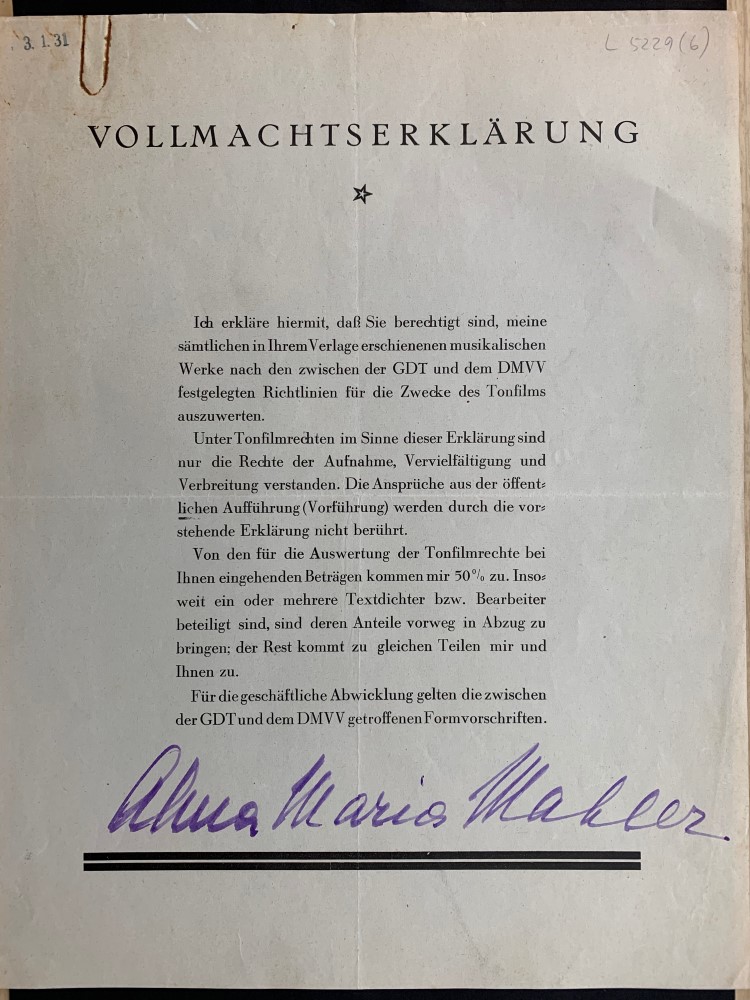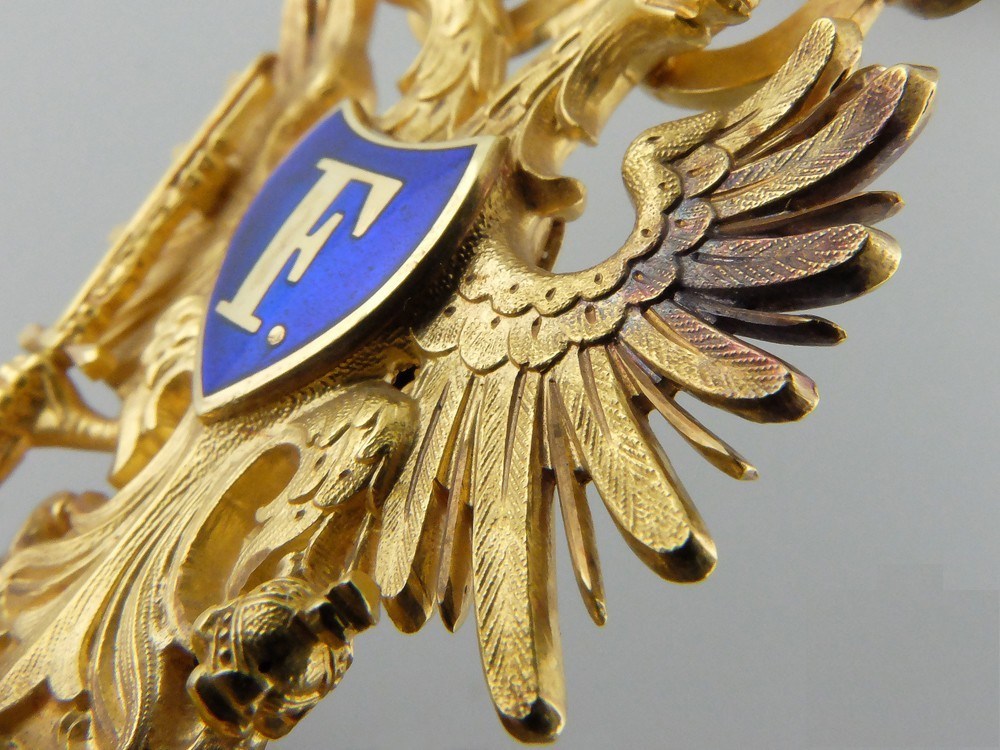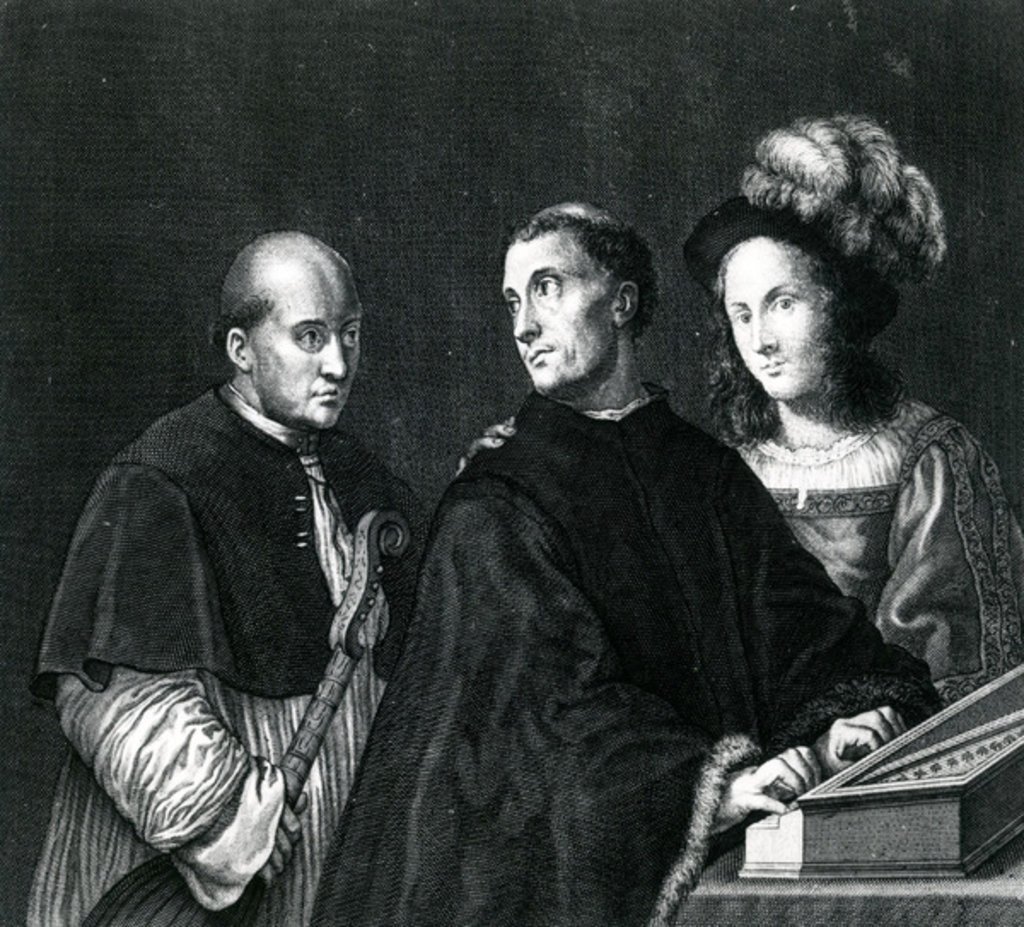Gustav Mahler (1860-1911) and Alma Mahler (1879-1964)
- 1930: Hans Gu?rtler was an attorney in Vienna. Kallir was an art dealer and a friend of Alma’s, who wrote a letter to Gu?rtler on her behalf. Draxler was an attorney and had been minister of finance in Austria during the 1930s. Legler and Grimschitz were witnesses in court proceedings in Alma Mahler’s case: Legler was a nephew of Alma Mahler; and Grimschitz was director of the O?sterreichischen Gallerie during the Nazi era.
- 1931: 03-01-1931: Signing of a “Vollmachtserklärung” (power of attorney authorization) that declares that Alma Mahler (1879-1964) grants the right to use all the works of Mahler issued by this publisher Bote & Bock music publishers [Ed. Bote & G. Bock of Berlin] in film productions, and establishes her right to 50% of the profits from such use.
- 1945: During the trial in 1945 Wilhelm (Willy) Carl Emil Legler (1902-1960) subsequently acted as a witness nominated by Mahler-Werfel quite often in order to testify on internal family matters. The opposing party tried to undermine Legler’s credibility by insinuating that he was disappointed not to have received anything out of Moll’s estate.
- 1955: Otto Hein was an attorney in Vienna who was handling Alma Mahler’s postwar legal claims in Austria for restitution of property; he represented her up until his death, which (according to Alma’s correspondence with Wilhelm (Willy) Carl Emil Legler (1902-1960) occurred late in the fall of 1955. Around the time of Hein’s death, Alma, apparently dissatisfied that a significant aspect of the case had been settled in her disfavor, was also in the process of consulting with another attorney, Hans Gu?rtler. Subsequently, in 1956, Alma engaged Friedrich Weissenstein and he took over the case over from Hein’s office. At a later point, Alma also engaged Georg Weisl to review the case. Christine Olga Zimmer was a party to a draft agreement showing that she was a potential renter of Alma Mahler’s house in Vienna. Anton Klement was an Austrian official who presided over the transfer of certain paintings from the estate of Maria Eberstaller to Alma Mahler; the architect Wilhelm (Willy) Carl Emil Legler (1902-1960), a nephew of Alma who was residing in Vienna, received the paintings on her behalf.
- Friedrich Weissenstein was an attorney in Vienna whom Alma Mahler engaged to pursue her postwar legal claims for restitution of property in Austria; Simon was an attorney in Weissenstein’s office. Simon had been recommended to Alma by her nephew Wilhelm (Willy) Carl Emil Legler (1902-1960), following the death, in 1955, of her attorney Otto Hein, who had originally handled the case. Other attorneys she consulted in the case were Hans Gu?rtler and Georg Weisl.
- Ludwig Franz Tlapek was an attorney in Vienna who was arranging for the appropriate return of documents to Alma Mahler following the death of her attorney Otto Hein.
- Joseph. Simon was attorneys in Vienna whom Alma was considering engaging.
- Hofmannsthal was an attorney based at this time in Queens, N.Y., and was apparently representing Alma Mahler. Weisl was an attorney based in Vienna, to whom Alma had given authority (Vollmacht) to review the status of her case in the Austrian courts. Attorneys whom Alma had previously consulted in the matter of her postwar claims for restitution of property include Otto Hein, Hans Guertler, and Friedrich Weissenstein.
- Georg Weisl’s letter, addressed to Emilio von Hofmannsthal, concerns the prospects for a reopening of Alma Mahler’s case with regard to her postwar claims for restitution of property in Austria.
- Anton Klement was an Austrian government official involved in the case, and Kurt Frieberger was another official to whom she turned for help. Her friend Otto Kallir offered advice and assistance, and Wilhelm (Willy) Carl Emil Legler (1902-1960) tended to many matters for her in Vienna in the immediate postwar period.
- 2007. The Restitution of the Munch Painting “Summer Night at the Beach”. The Republic of Austria on formally returned ownership of the painting to Marina Fistoulari Mahler (1943), the grandchild of Alma Mahler-Werfel, the former owner of the artwork, who was forced to leave the painting in Vienna when she fled from the Nazi regime in 1937. See Marina Fistoulari Mahler (1943).
03-01-1931: This the “Vollmachtserklärung” (power of attorney authorization) that declares that Alma Mahler (1879-1964) grants the right to use all the works of Mahler issued by this publisher Bote & Bock music publishers [Ed. Bote & G. Bock of Berlin] in film productions, and establishes her right to 50% of the profits from such use.




